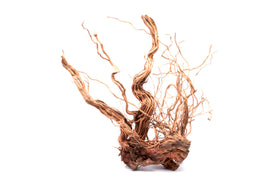
Buce Blog - Planted Tank Aquascaping Tips, How To, Advice
-
 Read nowBonsais are an excellent hardscape option for your aquarium. Learn how to care for your bonsai with these aquatic bonsai tree ideas for nature-style layouts.
Read nowBonsais are an excellent hardscape option for your aquarium. Learn how to care for your bonsai with these aquatic bonsai tree ideas for nature-style layouts. -

Shrimp vs. Snails: Which Clean-Up Crew Is Best?
Read nowShrimp and snails can both be great custodians for your aquarium. Learn which clean-up crew is best for your freshwater tank with this guide. -

Quiet and Efficient: Choosing the Right Aquarium Filters
Read nowChoosing a quiet and efficient aquarium filter keeps your tank clean while also making the most of your living art. Make an informed purchase with this guide. -

How to Keep Red Aquatic Plants Vibrant and Healthy
Read nowAre you looking for ways to bring out the rich red hues of your aquarium plants? Use these tips to keep your red aquatic plants vibrant and healthy. -

Top Trends in Aquarium Aquascaping for 2025
Read nowEvery year brings a ton of new ideas, looks, and solutions for aquascaping. Check out the top aquarium aquascaping trends in 2025 with this guide. -

Microsorum Java Fern Care Guide: Black Spot Causes & Solutions
Read nowAlthough this freshwater aquarium plant is famously "low-maintenance," certain challenges may arise if you don't meet its specific needs. Issues like browning leaves, stunted growth, or plantlets that struggle to thrive can leave hobbyists scratching their heads.
-

Algae in Aquariums: Causes, Common Types, and Effective Solutions
Algae is the result of an imbalance in your aquarium – most often between lighting and nutrients. Your focus shouldn't only be on preventing algae but also your aquarium plant growth and health.Read now -

How to Care for Guppies: Care, Diet, and Breeding
Read nowGuppies, with their vibrant colors and lively personalities, are one of the most popular fish in the freshwater aquarium hobby. Their ease of care in combination with the excitement of watching them breed makes guppies a delightful addition to any tank....
-

How To Grow Carpeting Plants in Any Type of Aquarium
Read nowFew things are more impressive in a planted freshwater tank than a dense, lush carpet. Carpeting plants are low-growing plants that cover the foreground of a planted aquarium, forming a thick mat. Growing a lush carpet may seem challenging to...












